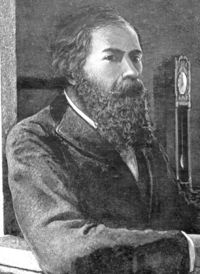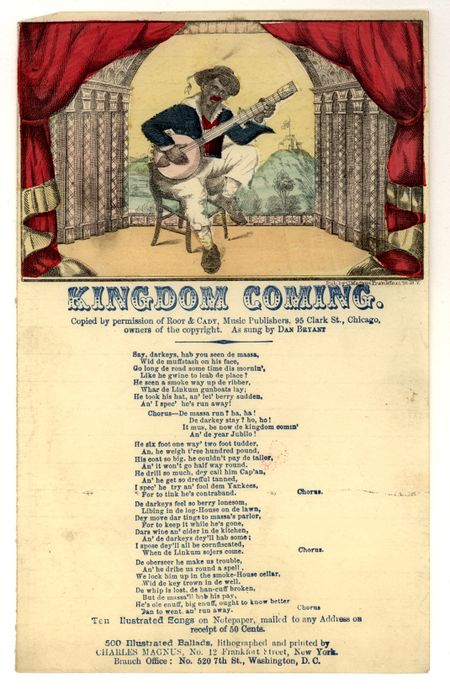Annotation:Year of Jubilo
X:1 T:Untitled T:Kingdom Coming M:2/4 L:1/8 R:Polka S:Anonymous 1862 American music manuscript collection (p. 15) N:https://archive.org/stream/MerryMen/MUMSS-00079#page/n0/mode/2up Z:AK/Fiddler’s Companion K:D A|DF FA|Af f/e/d/B/|Ad dF|E3 A| DF FA|Af f/e/d/B/|Ad e>f|d zd:| a|b>b bd'|a>b a/g/f/g/|ad'd'f|e3 a| df fa|Af f/e/d/B/|Ad dF|E3 a| b>c' d'b|d'3b|a>b af|a3 a| df fa|Af f/e/d/B/|Ad e>f|d2 z||
YEAR OF (THE) JUBILO. AKA and see "Massa's Gone Away," “Old Master's Runaway.” AKA – “Doodletown Fifer (2) (The),” “Jublio,” “Jubiller,” “Kingdom Coming," "Lincoln's Gunboats.” American, March; New England, March or Polka (2/4 time). USA, widely known. G Major (Brody): C Major (Person): D Major (Messer, Miller & Perron, Phillips). Standard tuning (fiddle). AABB. "Year of Jubilo" or "Kingdom Coming" [1] was an American stage and blackface minstrel song whose words and tune were written by New England abolitionist Henry Clay Work [2] in 1862. The song tells of the effect of freedom for slaves after their Master had evacuated his Plantation in advance of Union forces. The composer took his title from the biblical story that ancient Hebrews declared a "Jubilee Year" every half century in which all the slaves were freed. Work also composed such songs as the Civil War "Marching Through Georgia," "My Grandfather's Clock," and the music for "Wreck of the Old 97 (The)." His lyric begins:


Say, darkeys, hab you seen de massa,
Wid de muffstash on his face,
Go long de road some time dis morning’,
Like he gwine to leab de place?
He seen a smoke way up de ribber,
Whar de Linkum gunboats lay;
He took his hat, an’ let’ berry sudden,
An’ I spec’ he’s run away!
Chorus:
De massa run? ha, ha!
De darkey stay? ho, ho!
It mus, be now de kingdom comin’
An’ de year Jubilo!
